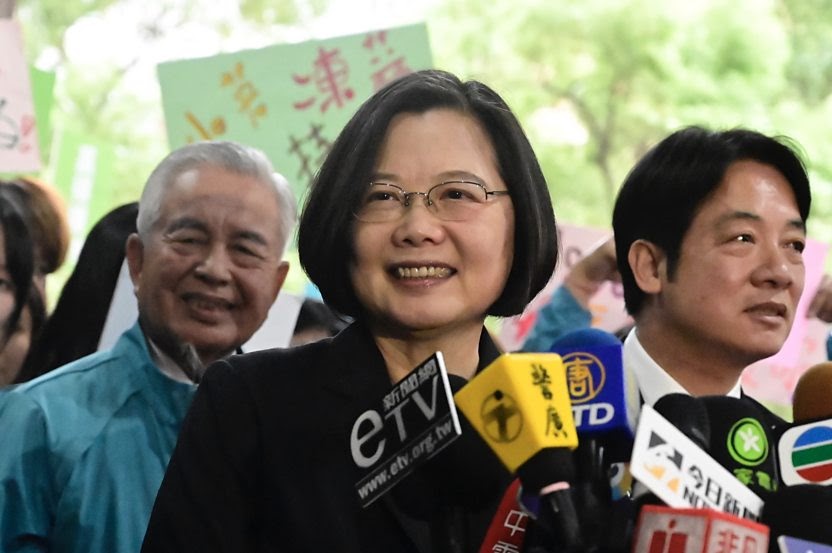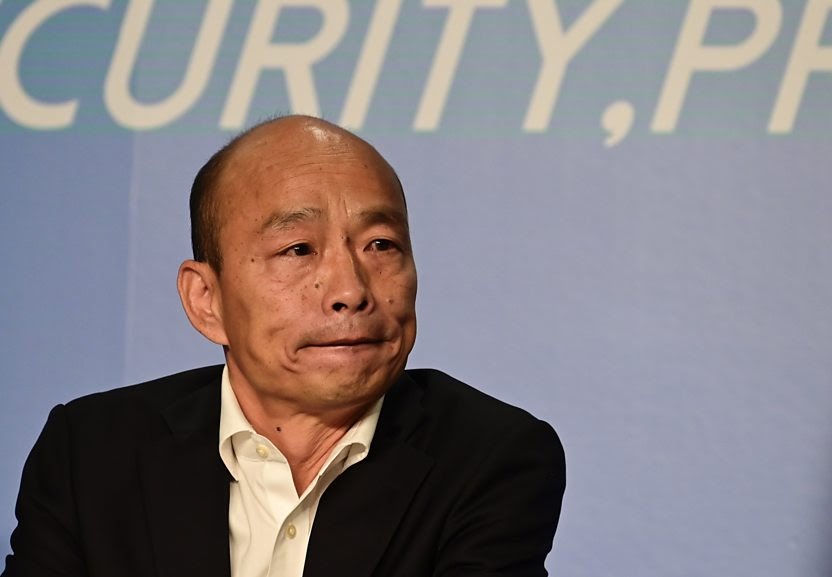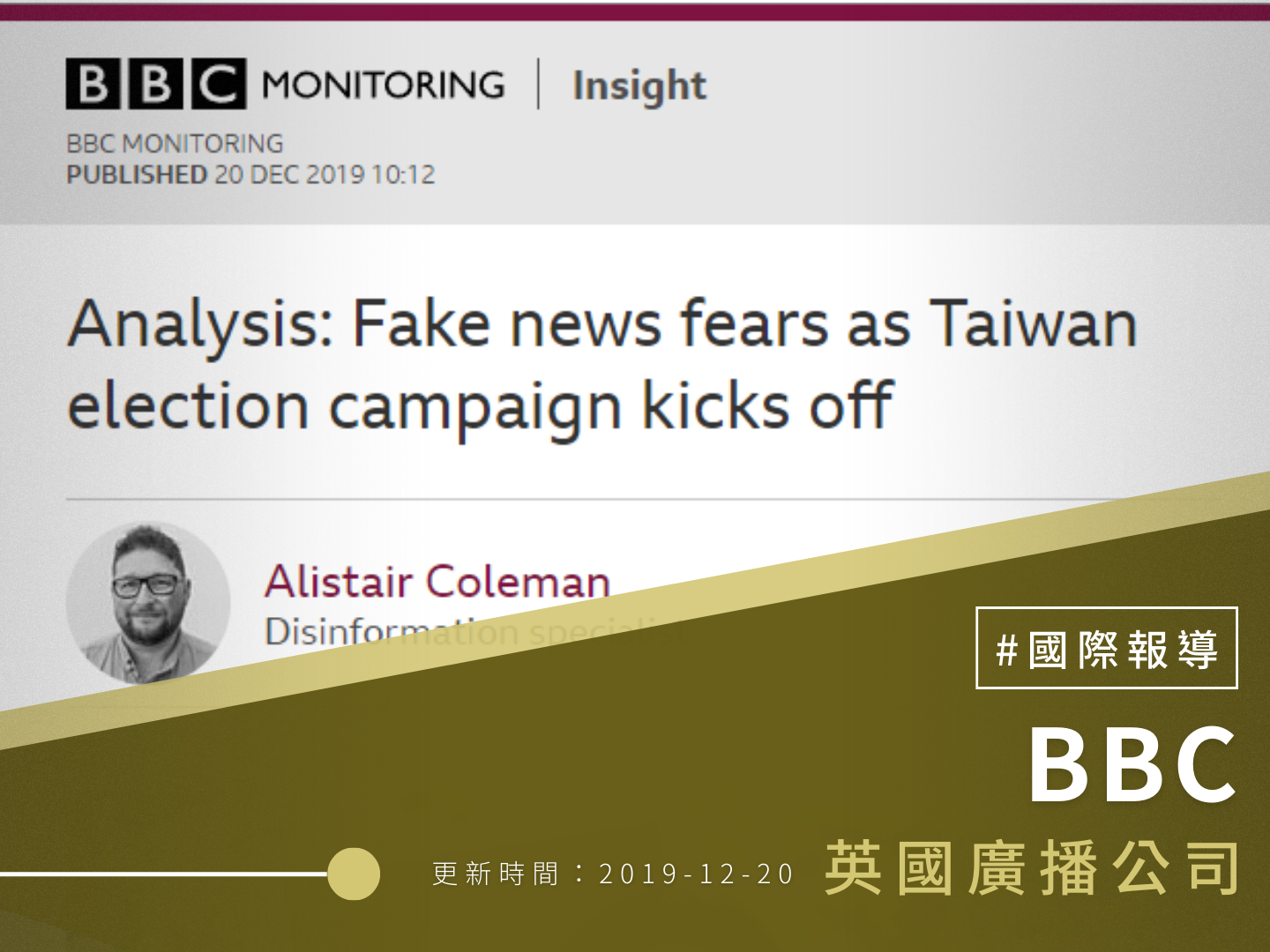【BBC】Analysis: Fake news fears as Taiwan election campaign kicks off
 Taiwan's President Tsai Ing-wen is hoping for re-election in January
Taiwan's President Tsai Ing-wen is hoping for re-election in January
Campaigning for Taiwan's presidential and legislative elections kicked off on 14 December amid fears that disinformation and rumours would play a role in the vote.
There are already accusations the ruling Democratic Progressive Party (DPP) is using the threat of “fake news” to silence the opposition.
There are also suggestions that neighbouring China will plant fake stories and attempt to sway Taiwanese public opinion.
Voters go to the polls to elect a new president on 11 January. Taiwan maintains it is an independent sovereign state, but China claims it is one of its own provinces, and even elects members to represent in its National People's Congress. As such Taiwan is not a member of the United Nations, and Beijing cuts diplomatic relations with countries which recognise its existence.

Kuomintang candidate Han Kuo-yu wants to put cross-strait talks back on track
What's happened so far?
On 13 December, the day before the official start of campaigning, Facebook removed scores of fan pages, groups and accounts supporting opposition Kuomintang (KMT) presidential candidate Han Kuo-yu.
According to the Taiwan News, Facebook said that the sanctioned accounts and pages had “been in violation of its guidelines”, and that it “was part of Facebook’s efforts to protect the fairness of Taiwan’s elections”.
However, Mr Han's campaign seemed to accept the decision, and urged his followers to “respect the rules… in order to help safeguard Taiwan’s democracy”.
Mr Han denies being China's “preferred candidate” despite his party's mainland-friendly stance.
To aid transparency, Facebook said it would publish data showing paid political adverts during the election campaign.
As of 18 December, the Facebook Ad Library shows NT$390,000 (US$12,930; £9,890) of advertising bought by the ruling DPP in the previous month, and nothing at all by the KMT.
Is there a threat from Beijing?
In the first week of campaigning, there have already been accusations that China is “meddling” with the election.
The strongly pro-independence Taipei Times published an editorial on 18 December accusing Beijing of using its vast economic clout to put indirect pressure on Taiwan.
In particular, it said that Beijing closed down China-based accounts belonging to a Taiwanese YouTube influencer Potter King after he refused to remove videos acknowledging Taiwanese leader Tsai Ing-wen as “president”, rather than Chinese leader Xi Jinping.
“Beijing is shooting itself in the foot by meddling in Taiwan’s entertainment business,” the editorial says, speculating whether this and similar incidents would have an effect on voters.
China has denied that it intends to intrude in Taiwan's election, its Taiwan Affairs Office telling Reuters that allegations of fake news are themselves fake news.
“Every time there is a Taiwan regional election, various fake news is 'created' to make rumours about and smear the mainland,” the Chinese government organisation said.
However, the ruling DPP appears to have made Chinese meddling an election issue, by introducing a draft bill last month aimed at outlawing foreign influence in the democratic process.
The proposed Anti-Infiltration Act aims to “prevent anyone from intervening in the nation's democratic political system” with the threat of long prison terms and big fines, Focus Taiwan reports.
The KMT, however, have dismissed it as “nothing but a ploy to manipulate the presidential and legislative elections”.
Taiwanese journalism to blame for fake news?
An opinion piece published by the Taipei Times the day before lamented the ease at which local press publishes unchecked false stories, and called for Taiwanese journalists to fight fake news in the run-up to the vote.
It cited an incident in 2018 where deliberate disinformation (“a hoax from China”, it said) was blamed for the suicide of a Taiwanese diplomat in Japan.
That hoax “could not have gone viral without the inadvertent assistance of several Taiwanese media outlets and political commentators that failed their fact-checking duties and made the 'fake news' look genuine,” Taipei Times said.
What Taiwan needs, Cedric Alviani of Reporters Without Borders says in the opinion piece, are measures to increase public trust in journalism.
“Taiwan cannot afford to wait any longer to restore trust in the media and effectively protect its institutions against disinformation attacks,” he writes.
Who's checking the facts in Taiwan?
Already there are two initiatives which aim to tackle disinformation in Taiwan.
Taiwan FactCheck Center (https://tfc-taiwan.org.tw/) is a non-profit organisation which says its purpose is to “check facts on information relevant to public affairs as well as to improve the information ecology and news quality of Taiwan”.
Its comprehensive coverage includes checking contentious news reports and debunking rumours doing the rounds on social media in a style similar to fact-checking site Snopes.
A recent investigation disproved rumours that Interior Ministry officials going door-to-door to check documents before the election are actually criminals intent on robbery. That rumour started in South Africa, in 2017, but has apparently resurfaced with a Taiwanese flavouring.
Speaking to Reuters, Summer Chen of Taiwan FactCheck Center said the sheer volume of disinformation and rumours – apparently coming from China – was overwhelming. “They are spreading faster and mobilising hatred,” she said.
Similarly, CoFacts (https://cofacts.g0v.tw/) corrects false narratives on social media and messaging apps.
It uses crowdsourcing to build a database of suspicious news stories and rumours, which other users either prove or disprove, creating a consensus among users.
With elections looming, CoFacts warns of the serious nature of its business: “We will not investigate celebrity gossip.”






